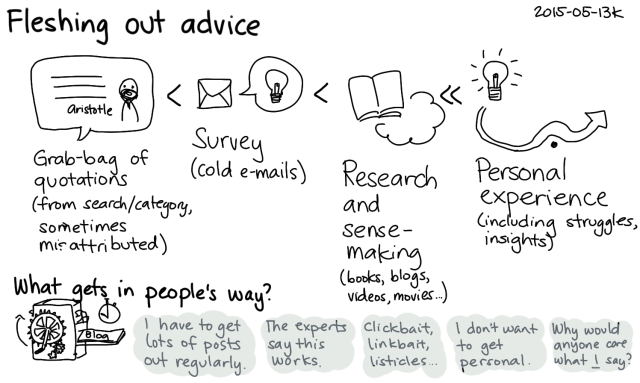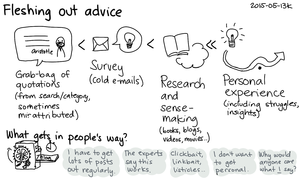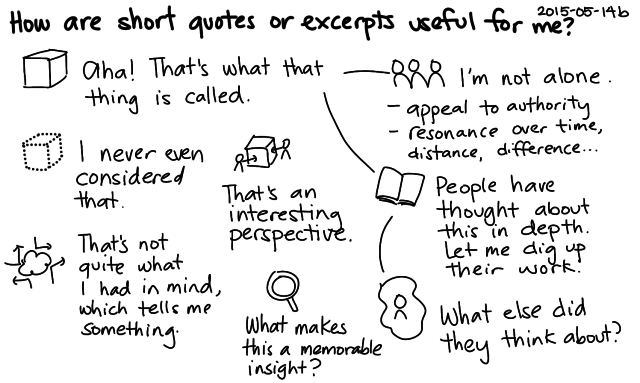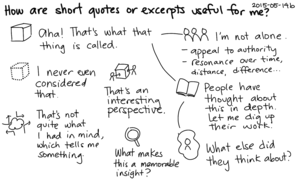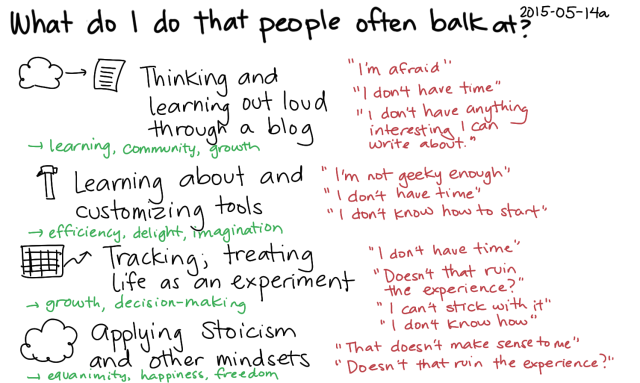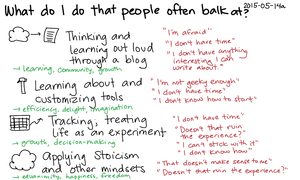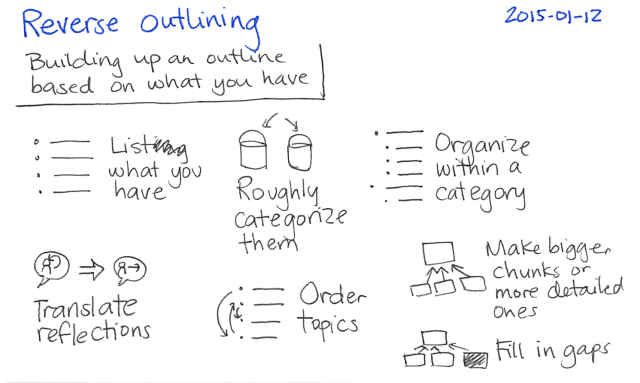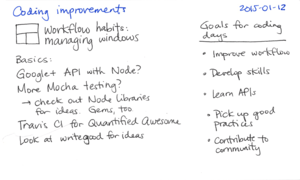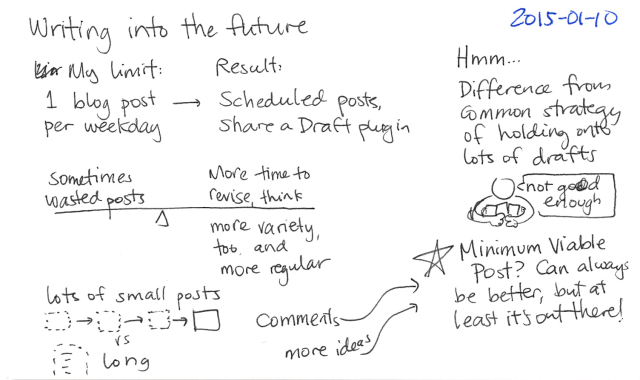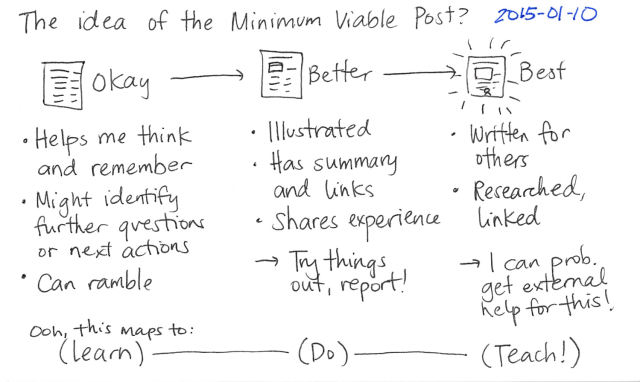I think I’ve written about something before, but I can’t find it. I have thirteen tabs open with Google search results from my blog. I’ve tried countless keywords and synonyms. I’ve skimmed through posts I only half-remember writing. (Was that blog post really that short? I thought I wrote more details.) I still haven’t found the post I want.
I wonder: Did I really publish it? Or did I just outline or sketch it? Am I confusing it with something similar that I wrote, or someone else’s post that I admired?
Ah, well, time to write it from scratch. It’s a little like writing code. Sometimes it would take so long to find an appropriate open source module that you’re better off just writing the code yourself. Sometimes it would take so long to find an existing post that it’s better to just write it from scratch.
I was looking for that particular post because of a conversation with Flavian de Lima where I mentioned the benefits of blogging while you’re learning something. He resonated with the idea of sharing your notes along the way so that other people can learn from them, even if you’ve moved on to different topics.
Despite having a clear memory of writing about this topic, when I went to the post that I thought was related to it (spiral learning), it didn’t mention blogging at all. “Share while you learn” didn’t quite address it, either. After trying lots of searches, I gave up and started writing a new post. After all, memories are fallible; you could have full confidence in an imagined event.
The reason this came up was because Flavian described how he often took advantage of open loops when working on writing. He would stop with an incomplete thought, put the draft away, and let his subconscious continue working on it. Sometimes it would be days or weeks before he got back to working on the article. He mentioned how other authors might take years to work on novels, dusting off their manuscripts and revising scenes here and there.
Keeping loops open by stopping mid-sentence or mid-task is a useful technique often recommended for writing or programming. Research describes this as the Zeigarnik effect: an interrupted task stays in your memory and motivates you to complete it.
But after reading David Allen’s Getting Things Done, I had become a convert of closed loops: getting tasks, ideas, notes out of your head and into a trusted system so that you don’t have to waste energy trying to remember them. I noticed that if I kept too many loops open, my mind felt buzzy and distracted. To work around this, I got very good at writing things down.
In fact, I took closing loops one step further. Publishing my notes on my blog helped me get rid of the guilt and frustration I used to feel whenever I found myself wanting to move on to a different project. Because my notes were freely available for anyone who was trying to figure out the same thing, I could go ahead and follow the butterflies of my interest to a different topic. My notes could also help me pick things up again if I wanted to.
I didn’t stop mid-sentence or mid-thought, but I published in the middle of learning instead of waiting until I finished. Even my review posts often included next steps and open questions. So I got a little satisfaction from posting each small chunk, but I still left dangling threads for me to follow up on. I closed the loops enough so that the topics didn’t demand my attention.
Writing helped me clear my mind of strong open loops–but it worked a little too well. I tried to close things off quickly, so that I could revisit them when I wanted to. The trick was remembering that they were there. Sometimes I forgot the dangling threads for a year or more. I never followed up on others. Even with my regular review processes, I often forgot what I had written, as in the search that prompted this post.
Writing and memory have an ancient trade-off. Even Socrates had something to say about it, quoting an ancient Egyptian king in Plato’s The Phaedrus:
“…for this discovery of yours will create forgetfulness in the learners’ souls, because they will not use their memories; they will trust to the external written characters and not remember of themselves.”
as quoted in On writing, memory, and forgetting: Socrates and Hemingway take on Zeigarnik
In 2011, Sparrow, Liu, and Wegner showed that people remember less if they think a computer will keep their notes for them, and they tend to remember how to get to the information rather than the information itself. Having written the words, published the posts, and indexed the titles, I’ve forgotten the words; and now I can’t find my way back.
Hence my immediate challenge: sometimes I forget how to get to the information I’ve stored, like a squirrel stashing nuts. (More research: tree squirrels can’t find 74% of the nuts they bury. So I’m doing slightly better than a squirrel, I think.)
Google helps if I can remember a few words from the post, but since it tends to search for exact words, I have to get those words right. Hah, maybe I need to use search engine optimization (SEO) techniques like writing with different keywords – not for marketing, but for my own memory. It reminds me of this SEO joke:
How many SEO copywriters does it take to change a lightbulb, light bulb, light, bulb, lamp, bulbs, flowers, flour…?
My blog index is helpful, but it isn’t enough. I need to write more descriptive titles. Perhaps I should summarize the key point as well. Maps can help, as can other deliberate ways of connecting ideas.
Let me take a step back and look at my goals here. Linking to posts helps me save time explaining ideas, build on previous understanding, and make it easy for people to dig into more detail if they want. But I can also accomplish these goals by linking to other people’s explanations. With so many people writing on the Web, chances are that I’ll find someone who has written about the topic using the words I’m looking for. I can also write a new post from scratch, which has the advantages of being tailored to a specific question and which possibly integrates the forgotten thoughts even without explicit links.
It’s an acceptable trade-off, I think. I’ll continue writing, even with the increased risk of forgetting. If I have to write from scratch even when I think I’ve probably written about the same topic before, I can accept that as practice in writing and thinking.
Other writers have better memories. Flavian told me how he can remember articles he wrote in the 1990s, and I’ve heard similar accounts from others. Me, I’ve been re-reading this year’s blog posts in preparation for my annual review, and I’ve come across ones that pleasantly surprised me. Posts two or three years back are even fuzzier in my memory. I can try to strengthen my memory through exercises and processes. The rest of the time, I can work with the brain that I have. In fact, I’m inclined to build more memory scaffolds around myself, moving more of my memory outside my mind.
[I do not] carry such information in my mind since it is readily available in books. …The value of a college education is not the learning of many facts but the training of the mind to think.
- Albert Einstein, as Wikiquotes cites from Einstein: His Life and Universe (2007)
And really, how much difference would perfect memory make? I might add more links, include more citations, cover more new ground. I can still learn and share without it.
Forgetful squirrels have their uses. Forgotten acorns grow into oaks for others to enjoy. From time to time, I hear from people who’ve come across old posts through search engines, or I come across old posts in a review. Loops re-open, dangling threads are taken up again, and we continue.

